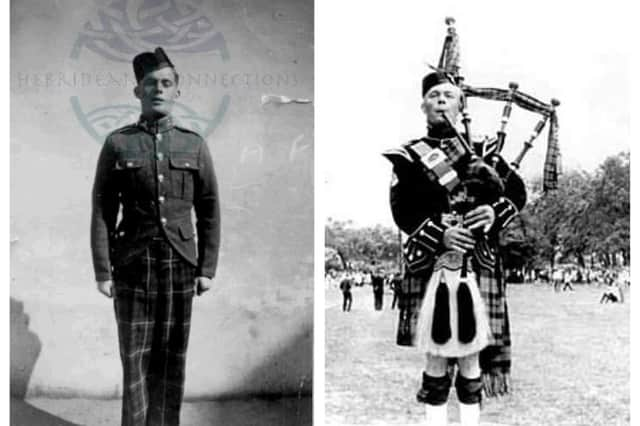Tribute to the island piper held a Prisoner of War


The life of Angus Ferguson, a piper with the Seaforth Highlanders who served with the 51st Division, is remembered this Remembrance Day.
Mr Ferguson, from Laxay on the Isle of Lewis, had left the army and was on his way home after time in Palenstine when war with Germany was declared in 1939. A sergeant waiting on the pier at Stornoway ordered him back to barracks, but Mr Ferguson borrowed a bike so he could cycle 15 miles in the dark to see his parents, before returning to service the next day.
Advertisement
Hide AdAdvertisement
Hide AdAfter being captured at St Valéry on 12 June 1940 as thousands were evacuated from Dunkirk, the piper played a pivotal role in the lives of many of the men who were being marched from France to Prussia.
His family have been told by a number of veterans that it was thanks to Mr Ferguson that they kept marching and survived, with the sound of the pipes the only thing to keep them going.
His grandcihldren, Stephen, Elaine and Maryanne, described him as “the most humble, gracious man. He never complained about anything.”
"He did not speak about his time as a POW often but when he did it was like he was reliving it,” they added.
Mr Ferguson , who died in 2003 agd 91, learned to play the pipes with the army, which he joined along with his three brothers.
In an earlier interview, he remembered being the piper as a ““very dangerous and very lonely” job.
Following his capture, he recalled being kept in a park in St Valery for three days without food with a 14-mile march then underway. Barges were later used to take the men through Belgium and Holland.
Mr Ferguson said: “Anything that was by the roadside you would gather it with you, you had to be careful or you would get the bullet or the rifle butt, which nearly broke my back as I reached for a turnip one time.”
Advertisement
Hide AdAdvertisement
Hide AdAfter finding themselves in a clog factory in Holland, they whittled down a wooden shoe to make a fire and boiled up what scraps they had in an old chamber pot.
He recalled: “When the meal was ready we were all desperate to start eating, but we had nothing to eat it from. So we had to wait, we put the fire out and let the stew cool down. Eventually everyone stood in a circle and we got a handful of the mixture.”
After being liberated from the Prisoner of War camp, Mr Ferguson returned to Lewis and married Christina Macmillan, with the couple having two children. He worked as a gravedigger in Stornoway and was a member of the Lewis Pipe Band for 25 years.
His grandson Stephen was taught to play the pipes by Mr Ferguson, who passed on his much loved Henderson chanter, which was with him during his time as a POW. It was played so much during the war the thumb hole on the back carries a deep indentation, with the wood worn away.
A message from the Editor:Thank you for reading this article. We're more reliant on your support than ever as the shift in consumer habits brought about by Coronavirus impacts our advertisers.
If you haven't already, please consider supporting our trusted, fact-checked journalism by taking out a digital subscription.
Comments
Want to join the conversation? Please or to comment on this article.